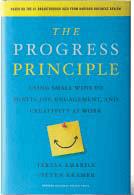The Power of Small Wins — And How to Keep Them Going
By Teresa Amabile, Baker Foundation Professor and Research Director at Harvard Business School
 Consider two facts. One: Many senior scientists and engineers in biopharma, during careers of 20, 30, even 40 years, have never been directly involved in developing a commercially successful drug. Not once. Two: Of all the things that can keep people engaged and productive in meaningful creative work — like discovering groundbreaking disease treatments — the single most important is simply making progress. Because drug R&D is likely to remain difficult even as technology advances, the challenge for you, as a leader, is this: How do you maintain the motivation of talented researchers, young and old, when progress is slow?
Consider two facts. One: Many senior scientists and engineers in biopharma, during careers of 20, 30, even 40 years, have never been directly involved in developing a commercially successful drug. Not once. Two: Of all the things that can keep people engaged and productive in meaningful creative work — like discovering groundbreaking disease treatments — the single most important is simply making progress. Because drug R&D is likely to remain difficult even as technology advances, the challenge for you, as a leader, is this: How do you maintain the motivation of talented researchers, young and old, when progress is slow?
By analyzing nearly 12,000 diary entries from 238 people doing the most important innovation projects in their companies, my team and I discovered that people are most creative when they are deeply engaged in their work and experiencing positive emotions. In fact, people are 50 percent more likely to come up with a new idea or solve a problem creatively on days of positive mood than days of negative mood. Setbacks in the work, the opposite of progress, are the main culprits in precipitating such negative mood. The bad news is that the negative effects of setbacks are three to four times stronger than the positive effects of progress.
CREATING MOMENTUM WITH SMALL WINS
The good news is that even incremental progress in meaningful work can powerfully boost engagement and elevate mood. We call that the power of small wins: fully 28 percent of seemingly trivial events at work have an outsize impact on motivation and emotion. Here’s how to harness that power in the difficult business of biopharma invention:
- Aspirational ultimate goals: Inspire your discovery teams with lofty, powerful goals in each project, tying those goals to a meaningful purpose.
- Chunk the ultimate goal into intermediate steps: Because it can take years to achieve that ultimate goal, reaching more manageable goals along the way — even minor ones — can keep people creatively engaged. Those small wins generate momentum.
- Create psychological safety: Maintain a day-today work environment where people welcome ideas, even seemingly crazy ones, and feel safe calling out failures and mistakes because they know debriefs will focus on the work — and not scapegoat the people involved.
- Celebrate progress and “smart setbacks”: Take a moment to recognize even small steps forward and — this is incredibly powerful — even recognize failures, when the effort was a good one.
- Extract failure value: Even failed projects usually yield new knowledge and products — like an interesting new molecule — that can be repurposed later. Be sure that knowledge extraction happens, and that the people involved in the original project know about it.
![]()
- Keep researchers in “the discovery chain”: Often, scientists who work on drug discovery in early stages have no idea what happens to their efforts as the project morphs and travels toward commercialization. Keep people informed, with an internal “genealogy” of each project so that no one, after 40 years, will say they’ve not been associated with a successful drug.
Taking these steps will maximize the likelihood that your scientists will bring their most creative selves to every project, every time.

